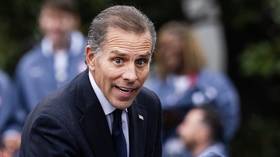New Zealand refuses to give up its zero-case Covid-19 strategy as infection numbers rise in Auckland
With new cases being reported in locked-down Auckland daily, New Zealand’s Covid-19 response minister has said the government will not abandon its zero-infections strategy, even as it is becoming increasingly unrealistic.
“We are not giving up on getting back down to zero. That is absolutely what we are striving for,” Chris Hipkins told a press conference on Wednesday, shortly after sweeping lockdown restrictions were eased in the country’s biggest city.
Having endured five weeks under a punishing level-four lockdown, Auckland was moved to level three on Tuesday night, though an array of rules severely limiting freedom of movement remain in place. Travel is allowed only for “permitted reasons,” such as going to work or school, or to undertake essential shopping. Residents can be asked to provide evidence that warrants their need to travel to a particular destination. They are also strongly encouraged to stay within their household “bubbles” as much as possible and to work from home. Masks are obligatory in shops, on public transport and in hospitals, and those who venture outside are asked to keep a two-meter (six-foot) distance from other passers-by. Restaurants are allowed to reopen their doors, but only for contactless pick-up, delivery, or drive-through collection. All gatherings, except for weddings and funerals, remain banned.
Announcing Auckland’s transition into a new lockdown phase, New Zealand Prime Minister Jacinda Ardern was quick to dispel any illusion that life had returned to normal. The level-three restrictions are set to last at least two weeks and the city “is not opening up,” she said. She also doubled down on her government’s controversial Covid-19 strategy, noting that New Zealand still has a policy of “zero tolerance for cases.”
The refusal of her government to follow the line taken by the rest of the world – including Australia, which has recently given up its “Covid zero” mantra – comes as the authorities struggle to suppress a Covid-19 outbreak in Auckland, where 23 new cases were reported on Wednesday, bringing the total number of cases in the current community outbreak to 1,108. Until this latest surge, driven by the Delta strain of the virus, New Zealand had managed to keep its numbers very low. Since the beginning of the pandemic, it has reported only 3,763 confirmed cases and 27 deaths.
While the government is insisting on sticking to its zero-tolerance approach to the virus, a top health official has seemingly admitted that strategy is flawed. Director-General of Health Ashley Bloomfield has argued that New Zealand may never again achieve the coveted null figure, and suggested its focus should instead be on ramping up its vaccination campaign.
“We may not get back to zero, but the important thing is we’re going to keep finding any infections and basically continue to contact trace, test, and isolate people,” he told Radio NZ on Wednesday, adding that, to regain their “freedoms,” some 90% of New Zealanders needed to be fully vaccinated. “That’s absolutely the new means whereby we will be able to get back to the freedoms we had under level one, and we’re all keen to do that,” Bloomfield said. So far, only 30% or 1,67 million people in New Zealand have been fully jabbed, while around 60% have received their first dose of a Covid-19 vaccine.
Like this story? Share it with a friend!














